
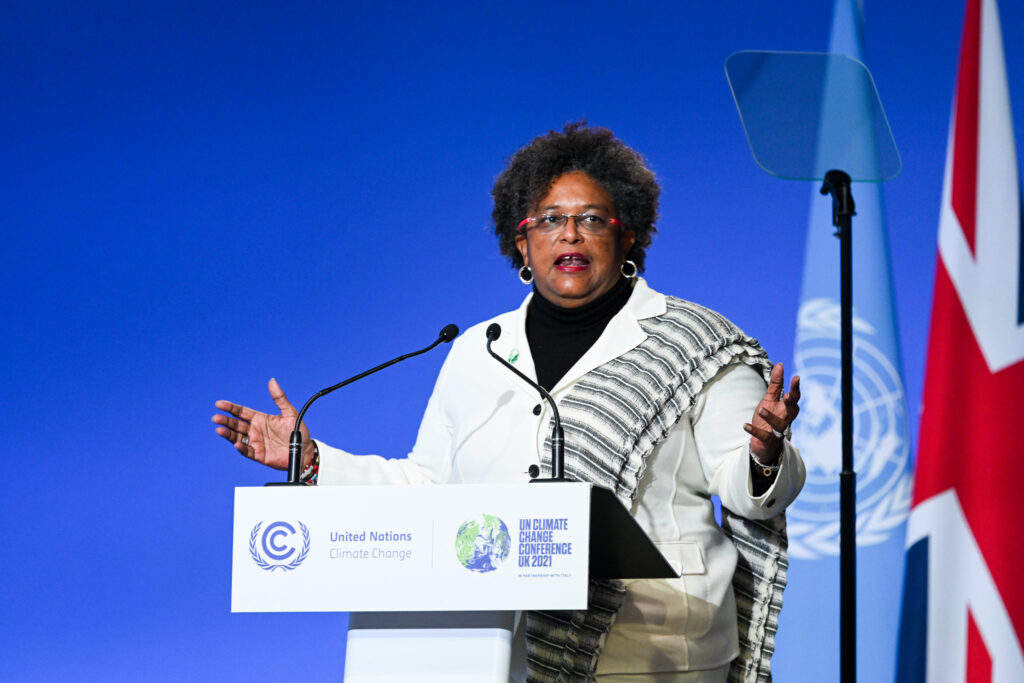
Mottley urged countries to close critical gaps related to mitigation, adaptation, and finance in order to deliver on the promises of the 2015 Paris Agreement.
Failure to provide enough climate funding to small island developing states and compensate for loss and damage from climate events is “measured in lives and livelihoods in our communities,” she said. “This is immoral, and it is unjust.”
Mottley implored the world’s leaders to lead and, for the sake of their own citizens, to find the resolve to limit global warming to 1.5 degrees Celsius above pre-industrial levels.
Countries’ current climate pledges, known as nationally determined contributions (NDCs), have put the planet on a pathway to 2.7 degrees, Mottley said, and even with more ambitious commitments, warming is likely to reach as high as 2 degrees. Echoing a phrase from the United Nations Secretary-General, she said that would be a “death sentence” for many small island countries.
“For those who have eyes to see, for those who have ears to listen, and for those who have a heart to feel, 1.5 is what we need to survive,” she said.
Mottley was hardly alone in sending out a “code red” as the two-week Conference of the Parties to the United Nations Framework Convention on Climate Change (COP26) began. UN Secretary-General António Guterres could not have been more blunt.
“Enough of treating nature like a toilet. Enough of burning and drilling and mining our way deeper. We are digging our own graves,” he warned.
The sense of urgency was echoed by presidents, prime ministers, and royalty. “Time has quite literally run out,” said Britain’s Prince Charles, who said a “war-like footing” is required to combat climate change and biodiversity loss. The doomsday clock is ticking, U.K. Prime Minister Boris Johnson said, and it’s “one minute to midnight.”
“If we don’t get serious about climate change today, it will be too late for our children to do so tomorrow,” he said.
And Txai Suruí, a 24-year-old indigenous woman from the Brazilian Amazon, put it this way: “The Earth is speaking. She tells us that we have no more time.”
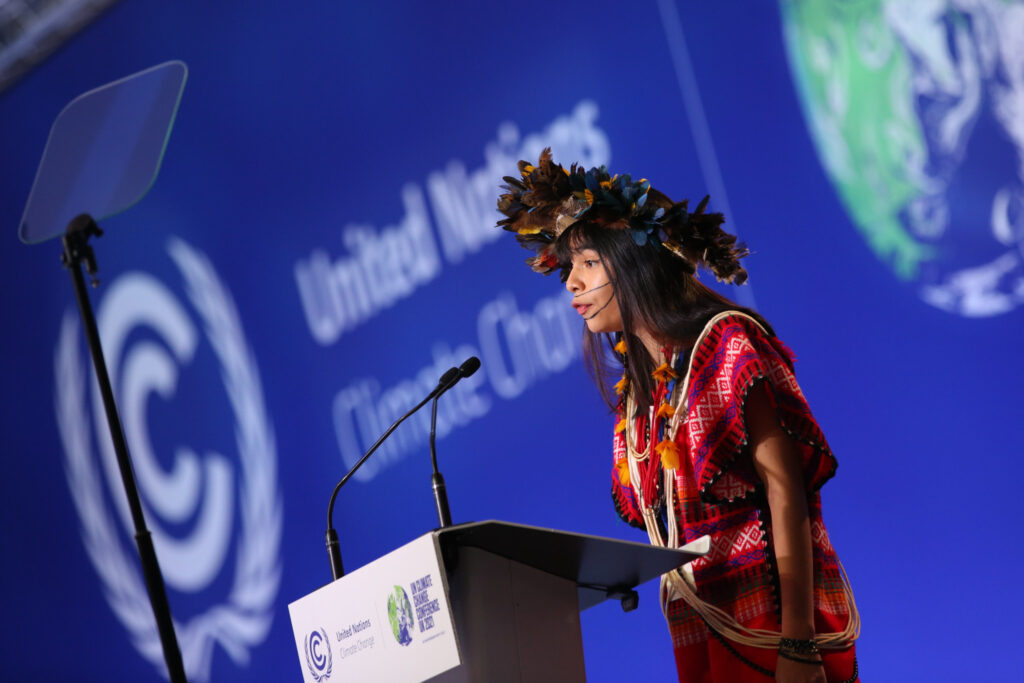
Txai Suruí at COP26.
Speaking in measured tones in English, she stood before the world leaders and described the consequences of a warming planet. “The animals are disappearing, the rivers are dying, and our plants don’t flower like they did before,” she said.
She called for a different path and global changes, without delay. “It’s not 2030, or 2050. It’s now.”
During the two-day World Leaders Summit that kicked off COP26, several leaders from countries hard-hit by climate-related disasters reminded the world of the human toll.
Two years after Hurricane Dorian devastated two of the islands that make up the Bahamas, it’s still not known exactly how many people lost their lives, said Prime Minister Philip Davis. “And some people still tremble at the first drop of rain,” he added.
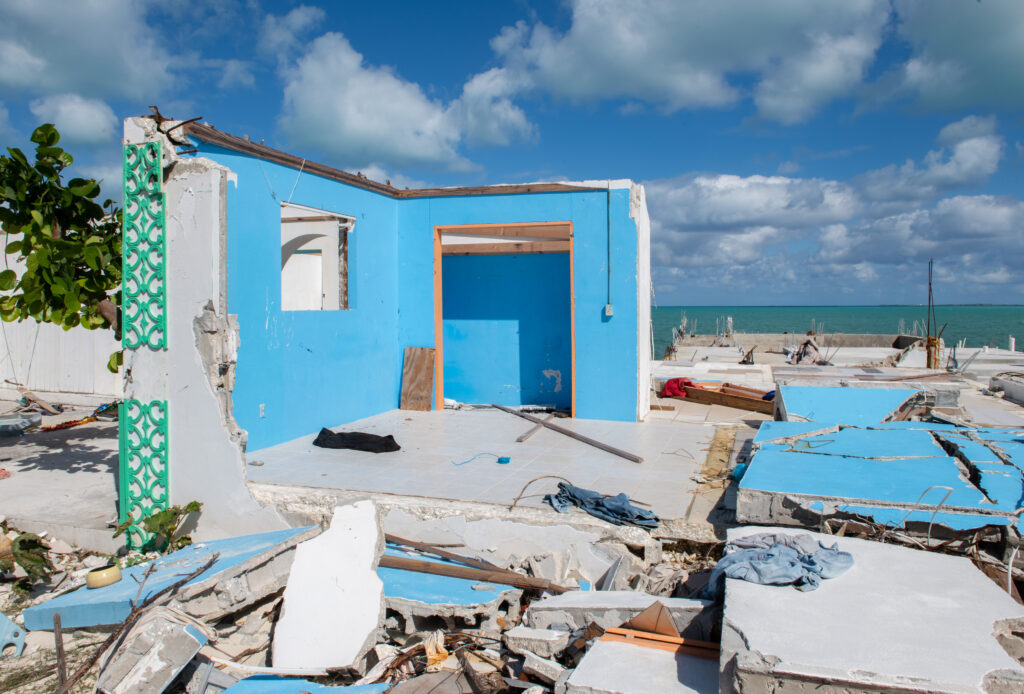
The Bahamas took a direct hit from Hurricane Dorian in 2019.
Without financing and other support to rebuild for resilience, “we will be left to the mercy of future Hurricane Dorians,” Davis said. “More of my people will die.”
Honduran President Juan Orlando Hernández said that from 1970 to 2020, his country recorded 82 natural disasters—67 of them influenced by the effects of climate change—which left some 22,000 people dead and another 11,000 missing. Many more people have lost everything they owned, and many have been forced to migrate, he said.
Last year, Hurricanes Eta and Iota hit Honduras two weeks apart and caused $210 million in damages, equivalent to 9.2% of the country’s GDP, Hernández said, adding that droughts in the past few years have also brought catastrophic loss. “How, then, can we prosper as we would like to, if every year our economic progress and social development are consumed by the environmental emergency?” he asked.
Sometimes the impacts are more gradual. Take, for example, the Belize Barrier Reef System—second only to Australia’s in size. Coral bleaching caused by human-induced climate change threatens not just this UNESCO World Heritage Site itself but the broader economy too, Belizean Prime Minister Johnny Briceño explained.
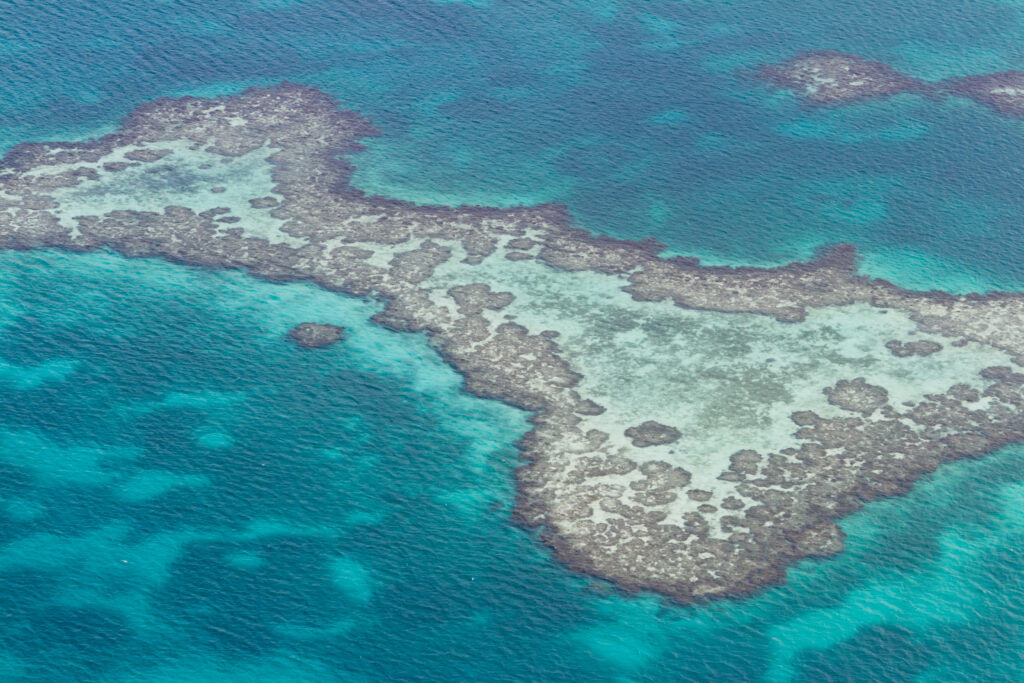
Aerial view of the barrier reef off the coast of San Pedro, Belize.
“For Belize,” he added, “the Belize Barrier Reef is more than a global beauty; it also underpins our culture and our tourism industry, which contributes approximately 40 percent to our gross domestic product.”
If countries were private companies and their leaders the CEOs, their performance on climate would get them all fired and put them out of business, said Costa Rican President Carlos Alvarado. “Why? Because we are off track. We are not delivering results.”
President Guillermo Lasso of Ecuador said this is a time for “global action based on strong and renewed multilateralism.”
For his part, Colombian President Iván Duque said countries must be clear in determining that they will meet their commitments to reduce greenhouse gas emissions and not regress. The 1.5-degree goal, he said, “is not negotiable.”
Eighteen heads of government in all from North, Central, and South America and the Caribbean addressed the summit, though the presidents of Latin America’s two largest economies, Brazil and Mexico, were conspicuously absent—as were the leaders of China, Russia, and several other G-20 countries. Negotiations among the COP26 delegates are scheduled to wrap up this week.
During the summit, leader after leader demanded that the developed countries step up and meet their longstanding—but still unrealized—commitment to collectively provide $100 billion per year in climate finance in support of developing countries.
Speaking on behalf of the Alliance of Small Island States, Prime Minister Gaston Browne of Antigua and Barbuda said that climate finance to these vulnerable countries had actually decreased by more than $600 million between 2018 and 2019. He also called for more focused attention on the issue of climate-related loss and damage.
“Should no formal mechanism for loss and damage compensation be established, member countries of the United Nations may be prepared to seek justice in the appropriate international bodies,” he said.
Prime Ministers Philip J. Pierre of Saint Lucia, Keith Rowley of Trinidad and Tobago, and Andrew Holness of Jamaica were among other Caribbean leaders who stressed the importance of funding for loss and damage, an aspect Pierre said should be considered “a distinct pillar of climate action and support.” They said that climate finance should go not just toward mitigation efforts to reduce emissions but also toward adaptation measures to adjust to the effects of climate change.
“If we are to have any realistic chance of meeting our climate ambitions,” Holness said, “we need financing that is predictable, less fragmented, and easier to access.”
Rowley noted that “the mobilization of private finance will also be critical for securing the urgently needed investment, particularly for the transformation of our energy sectors.”
Argentine President Alberto Fernández called for “environmental solidarity” and new financial approaches to bring about necessary transformations. “We must create payment mechanisms for ecosystem services, swap debt for climate action, and establish the concept of environmental debt,” he said.
In Bolivian President Luis Arce’s view, the onus is on developed countries to act. He said they must achieve real and immediate reductions of carbon emissions; change their economic model based on unlimited consumption; and fulfill their responsibilities to transfer financial resources and means of implementation to developing countries.
The world’s richer nations like the United Kingdom must and can “deactivate that ticking doomsday device” and “get real on coal, cars, cash, and trees,” Prime Minister Johnson said.
“As we look at the green industrial revolution that’s now needed around the world, we in the developed world must recognize the special responsibility we have to help everybody else to do it,” he said. Johnson noted that it was in Glasgow, 250 years ago, that James Watt came up with a machine powered by steam that was produced by burning coal. “Yes, my friends, we’ve brought you to the very place where the doomsday machine began to tick,” he said.
In his remarks, U.S. President Joe Biden stressed that this is a “decisive decade” in which the world must rise to the task of tackling climate change and seize the opportunities of an equitable, clean-energy future. The United States wants to lead “by the power of our example,” he said, though he acknowledged that it has not always done that.
“That’s why my administration is working overtime to show that our climate commitment is action, not words,” he said.
Prime Minister Pierre Trudeau of Canada pointed out that his country has already put a meaningful price on pollution and intends to “cap oil and gas sector emissions today and ensure they decrease tomorrow at a pace and scale needed to reach net-zero by 2050.”
“That’s no small task for a major oil- and gas-producing country,” he added.
President Mohammed Irfaan Ali of Guyana said that although his country has recently become an oil producer, “we support the removal of subsidies from fossil fuel production and advocate a strong global carbon price.” He also pointed to the role of his country’s forests in addressing climate change.
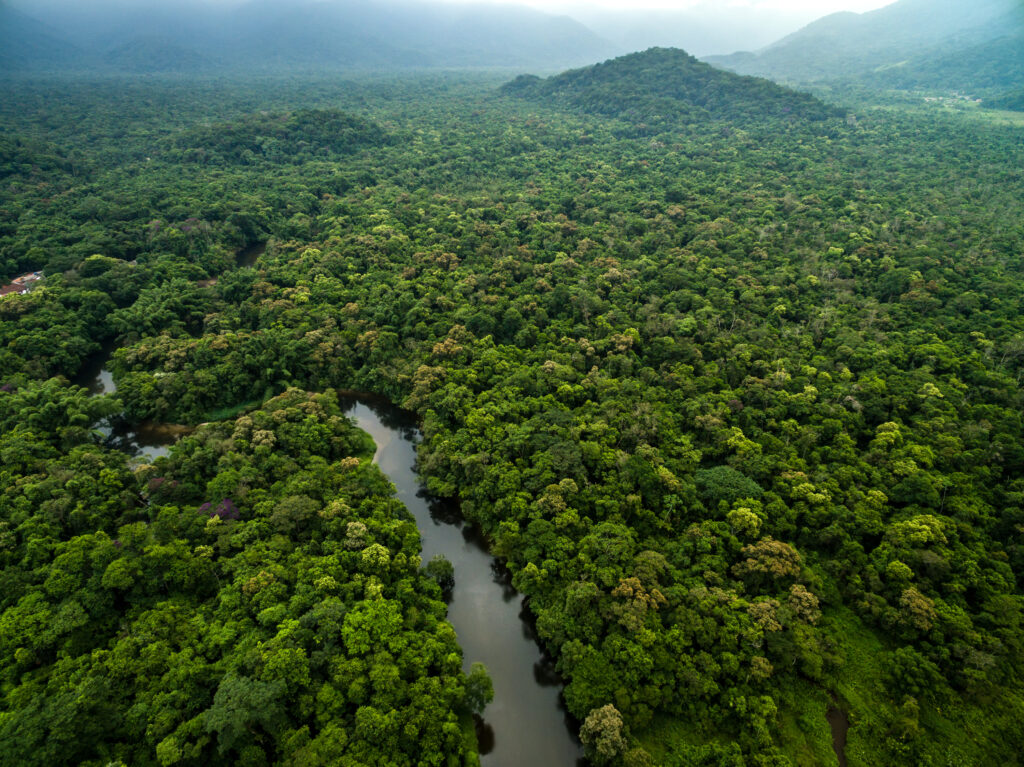
Aerial view of a tropical rainforest in Guyana.
“We will maintain our forests—almost the size of England and Scotland combined, storing 20 gigatons of carbon—as a global asset,” Ali said.
Meanwhile, Presidents Laurentino Cortizo of Panama and Chandrikapersad Santokhi of Suriname both noted that their countries are carbon-negative, thanks to their extensive forest cover.
“Many of the world leaders at this summit have shared their countries’ plans to become carbon-neutral by 2030, some by 2050,” Cortizo said. “We in Panama have already managed to become carbon-negative. In other words, Panama’s forests absorb more carbon than we emit as a country.”
Santokhi summed it up this way: “We see our commitment as a moral, developmental, and environmental investment for which appropriate compensation means and mechanisms need to be created to support sustainable transition in a green economy based on renewable energy resources.”
 View Map
View Map